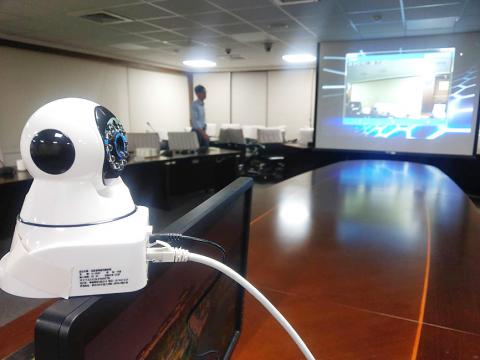The Institute for Information Industry on Friday issued a warning regarding the susceptibility of Internet protocol (IP) cameras to hacking.
People should avoid using unbranded IP cameras at home, Information Security Research division chief Kao Fu-kai (高傅凱) said.
Hackers can trace the cameras via IP addresses using software and hijack them, Kao said.

Photo: Cheng Wei-chi, Taipei Times
The institute cited incidents where IP cameras in the US were hacked, saying that the hackers used nude images of the users that they stole to extort money.
An IP camera was hacked in Taiwan in 2015, it added.
Distributors of unbranded IP cameras are usually not adequately acquainted with the technology to understand that surveillance equipment usually has two layers of information distribution, so they only set up security parameters for one layer, leaving the other layer unprotected, Kao said, adding that this is a back door waiting to be exploited by hackers.
The Internet of Things has further enhanced connectivity between devices, Kao said, adding that products such as smartwatches, smart TVs and autonomous vehicles use the Internet to send and receive information.
There are 23.1 billion smart products worldwide, more than three times the human population, Kao said, adding that the number is estimated to reach 50 billion next year.
The Consumer Protection Committee said that the Taiwan Association of Information and Communication Standards has a list of products that are “up to standard” in terms of information security, adding that people could refer to the list on the association’s Web site prior to purchasing such products.

RESPONSE: The transit sends a message that China’s alignment with other countries would not deter the West from defending freedom of navigation, an academic said Canadian frigate the Ville de Quebec and Australian guided-missile destroyer the Brisbane transited the Taiwan Strait yesterday morning, the first time the two nations have conducted a joint freedom of navigation operation. The Canadian and Australian militaries did not immediately respond to requests for comment. The Ministry of National Defense declined to confirm the passage, saying only that Taiwan’s armed forces had deployed surveillance and reconnaissance assets, along with warships and combat aircraft, to safeguard security across the Strait. The two vessels were observed transiting northward along the eastern side of the Taiwan Strait’s median line, with Japan being their most likely destination,

‘NOT ALONE’: A Taiwan Strait war would disrupt global trade routes, and could spark a worldwide crisis, so a powerful US presence is needed as a deterrence, a US senator said US Senator Deb Fischer on Thursday urged her colleagues in the US Congress to deepen Washington’s cooperation with Taiwan and other Indo-Pacific partners to contain the global security threat from China. Fischer and other lawmakers recently returned from an official trip to the Indo-Pacific region, where they toured US military bases in Hawaii and Guam, and visited leaders, including President William Lai (賴清德). The trip underscored the reality that the world is undergoing turmoil, and maintaining a free and open Indo-Pacific region is crucial to the security interests of the US and its partners, she said. Her visit to Taiwan demonstrated ways the

GLOBAL ISSUE: If China annexes Taiwan, ‘it will not stop its expansion there, as it only becomes stronger and has more force to expand further,’ the president said China’s military and diplomatic expansion is not a sole issue for Taiwan, but one that risks world peace, President William Lai (賴清德) said yesterday, adding that Taiwan would stand with the alliance of democratic countries to preserve peace through deterrence. Lai made the remark in an exclusive interview with the Chinese-language Liberty Times (sister paper of the Taipei Times). “China is strategically pushing forward to change the international order,” Lai said, adding that China established the Asia Infrastructure Investment Bank, launched the Belt and Road Initiative, and pushed for yuan internationalization, because it wants to replace the democratic rules-based international

RELEASED: Ko emerged from a courthouse before about 700 supporters, describing his year in custody as a period of ‘suffering’ and vowed to ‘not surrender’ Former Taiwan People’s Party (TPP) chairman Ko Wen-je (柯文哲) was released on NT$70 million (US$2.29 million) bail yesterday, bringing an end to his year-long incommunicado detention as he awaits trial on corruption charges. Under the conditions set by the Taipei District Court on Friday, Ko must remain at a registered address, wear a GPS-enabled ankle monitor and is prohibited from leaving the country. He is also barred from contacting codefendants or witnesses. After Ko’s wife, Peggy Chen (陳佩琪), posted bail, Ko was transported from the Taipei Detention Center to the Taipei District Court at 12:20pm, where he was fitted with the tracking